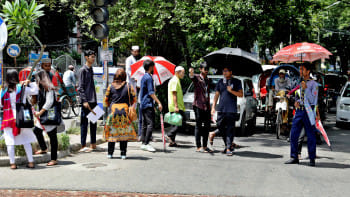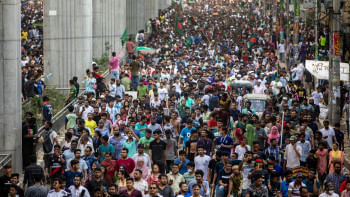The power of education in ‘Bangla Bashanta'

The latest wave of student-led uprisings in Bangladesh, widely referred to as the "Bangla Bashanta" (Bangla Spring), symbolises a profound sociopolitical awakening. This seasonal metaphor, akin to the Arab Spring, represents the blossoming of collective consciousness and the quest for meaningful change. The Bangla Bashanta channels the frustrations and aspirations of a generation yearning for educational reform, resistance, and democratic renewal—much like the socioeconomic grievances and demographic pressures that fuelled the Arab Spring.
At the heart of this movement lies a youth bulge—an entire generation of young people who, despite having access to education, find themselves underemployed and dissatisfied with the status quo. These youth, who constitute 28 percent of the population, have become the vanguard of the movement, driven by the paradox of being educated yet unemployable. The frustration is evident: official records indicate that 12 percent of university graduates are unemployed, a figure notably higher than that of individuals with only primary or secondary education. Last year's data estimated that 800,000 graduates were without jobs, unable to enter the informal sector due to the so-called prestige associated with higher education. This stark mismatch between educational attainment and employment opportunities underscores the systemic issues plaguing the nation's education system.
Interestingly, it was a generation whose education failed to prepare them for the rapidly evolving demands of the global job market that spearheaded this revolution—rather than organised political parties led by the educated elite. The movement, although centred at the country's oldest university with its historical track record of successful employment, spread like wildfire across the nation. Students from private universities also joined with revolutionary zeal, despite being less likely to pursue public sector jobs. This widespread discontent is a direct result of years of neglect in the educational sector, where the government, in its pursuit of populist numbers, has compromised on quality, spreading resources thin. While previous administrations have made strides in enrolment and access, the quality and relevance of education have not kept pace, leaving graduates in a prolonged state of "waithood"—a term that encapsulates the limbo between graduation and employment.
Pervasive inequities and the low quality and irrelevance of education further exacerbate this frustration. Employers frequently lament the basic competencies of graduates, despite years of formal education. This has led many private organisations with an international outlook to rely on expatriate staff, further shrinking the already limited job market for local graduates and putting additional pressure on the national economy. Efforts to replace rote learning with more creative curricula have faltered due to poorly trained teachers, resulting in conflicting education policies that fail to align with the needs of the modern workforce. The overemphasis on securing government jobs—a shrinking sector—has further stymied the potential of the youth, limiting their prospects in an increasingly diversified global economy.
Moreover, the glass ceiling remains a significant barrier for female students, particularly in the tertiary education system. Despite progress, educational inequities persist, with girls and children from disadvantaged backgrounds continuing to struggle with access to quality education. However, it is worth noting that female students, who played a bold and prominent role in the movement, called for an end to the quota system, driven by their confidence in their ability to shoulder equal responsibilities in society. This highlights a generational shift in attitudes, where young women are increasingly demanding the same opportunities and recognition as their male counterparts.
Identity and ideology politics also played an essential role in brewing the Bangla Bashanta. The overemphasis on a monolithic history has backfired. Generation Z has actively recycled slogans from the Liberation War to redefine their identity and advance nationalist perspectives that are conscious of protecting sovereignty and freedom of expression. They sought to reclaim and reaffirm the national identity forged in 1971, ensuring that their education serves not just as a pathway to employment, but as a means of preserving and propagating the core values of the nation. This ideological shift underscores the role of education in shaping not only the economic prospects of the youth, but also their cultural and political consciousness.
The Bangla Bashanta thus serves as a clarion call for a new educational compact in Bangladesh—one that prioritises quality, relevance, and equity while embracing the identity and ideological dimensions of education. Education should not only be about access, but also about equipping students with the skills and knowledge necessary to navigate the complexities of the 21st century. Drawing from the global discourse on education, Bangladesh must embrace the principles of the Global Compact on Learning, which advocates for a comprehensive approach to education that includes early childhood development, basic literacy and numeracy, and access to relevant post-primary education.
To achieve this transformation, we need visionary leadership and collective action. Just as the Global Compact on Learning emphasises international cooperation, Bangladesh must mobilise its resources—across government, the private sector, civil society, and international partners—to prioritise learning outcomes. This will necessitate not only increased funding, but also the effective use of resources and a commitment to measuring and improving learning outcomes. One hopes that the interim government will increase budget allocations for the organic growth of education. The impressive deliberations by our leaders on talk shows must now be put into action to achieve real change. This change must come with a reassessment of our young generation, for whom education is designed. For a long time, we have underestimated this generation, thinking that they are not equipped to bring about any change, either for themselves or for society. Yet, here we are, learning from their creativity and innovation—from their use of technology and cyber-activism. Incorporating recent experiences into curriculum redesign is crucial to enhancing the overall educational ecosystem.
Advocacy and public opinion will play a critical role in holding the government accountable for these results. Youth have historically led change in Bangladesh, so they must be actively involved in this process to ensure that their voices and needs are heard. The Bangla Bashanta is more than just a moment in time; it is a movement that can be used to transform education into a powerful tool for resistance, reform, and democracy.
The students have spoken. The unmet aspirations of youth are now out in the open. By addressing the systemic issues in the education system—quality, relevance, equity, and the integration of identity and ideology—we now have the opportunity to harness the potential of our youth and pave the way for a more prosperous, equitable, and democratic future. The success of this movement will ultimately depend on our collective ability to reimagine education as a catalyst for meaningful and lasting change.
Dr Shamsad Mortuza is professor of English at Dhaka University.
Views expressed in this article are the author's own.
Follow The Daily Star Opinion on Facebook for the latest opinions, commentaries and analyses by experts and professionals. To contribute your article or letter to The Daily Star Opinion, see our guidelines for submission.

 For all latest news, follow The Daily Star's Google News channel.
For all latest news, follow The Daily Star's Google News channel. 











Comments